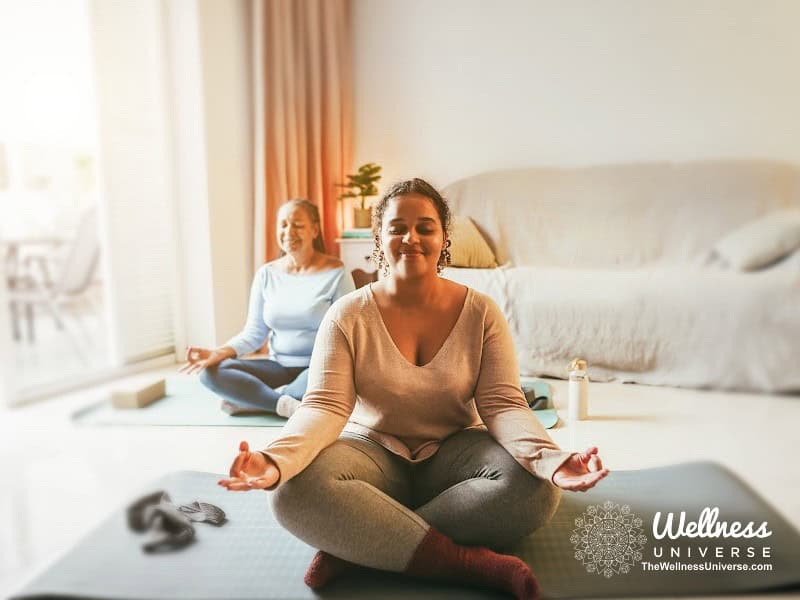In recent years, yoga and mindfulness practices have gained widespread popularity as effective tools for enhancing mental well-being. The increasing body of scientific evidence supports the positive impact these practices can have on reducing symptoms of anxiety, stress, and depression, while promoting relaxation and emotional balance. Combining physical postures, breathing techniques, and meditation, yoga offers a holistic approach to mental health that not only improves the body but also strengthens the mind.
This blog will explore how yoga and mindfulness practices can improve mental health, highlighting the science behind these techniques, their benefits for anxiety and stress reduction, and practical ways to incorporate them into daily life.
1. Yoga and Its Role in Mental Health
Yoga is a mind-body practice that originated in ancient India and has since evolved into a popular form of exercise and relaxation worldwide. It involves a combination of physical postures (asanas), breathing exercises (pranayama), and meditation (dhyana) to promote harmony between the body and mind.
How Yoga Affects the Brain and Body
When practiced regularly, yoga has profound effects on both the brain and the body. Studies have shown that yoga can lead to structural and functional changes in the brain, particularly in areas associated with stress regulation and emotional control.
- Increased GABA Levels: One of the ways yoga helps reduce anxiety is by increasing levels of gamma-aminobutyric acid (GABA), a neurotransmitter that promotes calmness and relaxation. Low levels of GABA have been linked to anxiety and mood disorders. Research has found that yoga practitioners experience a significant boost in GABA levels after just one session, which correlates with reduced anxiety and improved mood (Streeter et al., 2010).
- Reduced Cortisol: Cortisol is known as the “stress hormone” because it is released during stressful situations. Chronically elevated cortisol levels are linked to anxiety, depression, and a variety of physical health problems. Yoga has been shown to lower cortisol levels, which helps reduce stress and improve overall well-being (Thirthalli et al., 2013).
- Activation of the Parasympathetic Nervous System: Yoga promotes relaxation by stimulating the parasympathetic nervous system, which is responsible for the body’s “rest and digest” response. This activation counters the effects of the sympathetic nervous system, which triggers the “fight or flight” response during stressful situations. By engaging the parasympathetic system, yoga helps lower heart rate, relax muscles, and promote feelings of calm (Woodyard, 2011).
2. Mindfulness Meditation: A Key Component of Mental Health
Mindfulness meditation is the practice of focusing on the present moment, observing thoughts and feelings without judgment, and cultivating awareness. It is a central aspect of yoga practice but can also be practiced on its own. Numerous studies have demonstrated that regular mindfulness meditation can lead to significant improvements in mental well-being.
How Mindfulness Affects Mental Health
Mindfulness meditation works by increasing awareness and promoting a non-reactive stance toward emotions. This practice helps individuals become more in tune with their thoughts, feelings, and sensations, fostering a sense of acceptance and reducing emotional reactivity.
- Reduced Symptoms of Anxiety and Depression: Mindfulness-based interventions have been shown to significantly reduce symptoms of anxiety and depression. A meta-analysis conducted by Hofmann et al. (2010) found that mindfulness practices lead to moderate reductions in anxiety and depression across various populations, including those with generalized anxiety disorder and social anxiety disorder (Hofmann et al., 2010). This reduction in symptoms is often attributed to the increased ability to regulate negative emotions and the enhanced awareness of one’s internal state.
- Enhanced Emotional Regulation: Mindfulness practices enhance emotional regulation by promoting a non-judgmental awareness of thoughts and feelings. This allows individuals to observe their emotions without getting overwhelmed by them, helping to prevent emotional outbursts or rumination. Over time, mindfulness strengthens the brain’s ability to regulate emotions, leading to greater emotional stability (Tang et al., 2015).
- Improved Focus and Cognitive Function: In addition to its emotional benefits, mindfulness meditation has been shown to improve cognitive function, including attention and memory. Regular meditation practice enhances executive function, which includes skills such as decision-making, problem-solving, and the ability to focus (Zeidan et al., 2010). By improving cognitive control, mindfulness helps individuals better manage the stressors and challenges of daily life.
3. Yoga and Mindfulness for Anxiety and Stress Reduction
Anxiety and stress are among the most common mental health issues affecting people today. With the constant pressures of work, relationships, and everyday life, many people struggle to find relief from their anxious thoughts and chronic stress. Yoga and mindfulness offer powerful tools for managing these conditions by providing both immediate relief and long-term benefits.
Yoga as a Stress Reliever
The physical postures and breathing exercises in yoga promote relaxation and help release tension from the body. Specific yoga poses, such as child’s pose (Balasana), legs-up-the-wall (Viparita Karani), and corpse pose (Savasana), are particularly effective in calming the nervous system and reducing feelings of stress and anxiety.
- Breathing Techniques (Pranayama): Controlled breathing, or pranayama, is a central component of yoga practice and a powerful tool for reducing stress and anxiety. Deep, slow breathing stimulates the parasympathetic nervous system, calming the mind and body. Techniques such as Ujjayi breath (victorious breath) and Nadi Shodhana (alternate nostril breathing) can help soothe anxiety and promote a sense of inner calm.
- Physical Postures (Asanas): Many yoga poses help release physical tension that accumulates in the body during periods of stress. Gentle forward bends, restorative backbends, and hip-opening poses can help relieve tightness in the muscles and promote relaxation.
Mindfulness Meditation for Anxiety
Mindfulness meditation works by shifting attention away from anxious thoughts and focusing on the present moment. This shift helps individuals recognize when they are becoming overwhelmed by worry and provides a way to disengage from negative thought patterns.
- Body Scan Meditation: One popular mindfulness technique for reducing anxiety is the body scan, where individuals focus on different parts of their body, paying attention to sensations, tension, or discomfort. This practice helps cultivate a connection between the mind and body and promotes relaxation by releasing physical tension.
- Breath Awareness: Focusing on the breath is another simple but effective mindfulness technique for managing anxiety. When individuals concentrate on the rhythm of their breathing, they anchor themselves in the present moment, reducing the tendency to ruminate on anxious thoughts about the future.
4. Yoga and Mindfulness for Depression Management
Depression can make even the simplest tasks feel overwhelming. However, yoga and mindfulness offer gentle, non-invasive approaches that can complement traditional treatments for depression. These practices promote positive mental health by encouraging self-compassion, fostering a sense of connection, and providing tools for managing difficult emotions.
Yoga’s Impact on Depression
Several studies have shown that regular yoga practice can reduce symptoms of depression, improving overall mood and emotional well-being. This effect is often linked to yoga’s ability to increase levels of serotonin and dopamine, the “feel-good” chemicals in the brain (Streeter et al., 2010).
- Restorative Yoga: Restorative yoga, which focuses on gentle, supported poses held for longer periods, is particularly beneficial for individuals with depression. This type of yoga encourages deep relaxation and helps release emotional tension stored in the body.
- Yoga Nidra (Yogic Sleep): Yoga Nidra is a form of guided meditation that induces deep relaxation and promotes a state of consciousness between waking and sleeping. This practice has been shown to reduce depressive symptoms and promote a sense of peace and well-being (Saxena et al., 2016).
Mindfulness for Depression
Mindfulness practices help individuals with depression by encouraging them to observe their thoughts and emotions without judgment. This non-reactive awareness allows people to experience their emotions without becoming overwhelmed, reducing the severity of depressive episodes.
- Mindfulness-Based Cognitive Therapy (MBCT): MBCT is an evidence-based therapeutic approach that combines mindfulness meditation with cognitive-behavioral techniques. It has been shown to be effective in preventing relapse in individuals with recurrent depression by helping them develop greater awareness of negative thought patterns and reducing emotional reactivity (Segal et al., 2018).
5. Incorporating Yoga and Mindfulness Into Daily Life
The beauty of yoga and mindfulness practices is that they are accessible to everyone, regardless of experience or physical ability. By incorporating even a few minutes of these practices into your daily routine, you can reap the mental health benefits they offer.
Start Small and Be Consistent
If you’re new to yoga or mindfulness, it’s essential to start with small, manageable goals. Begin with just 10–15 minutes of meditation or a short yoga session each day. Over time, you can gradually increase the duration of your practice as you become more comfortable with the techniques.
Create a Calm Space
Having a dedicated space for your yoga and mindfulness practice can enhance the experience. Find a quiet, clutter-free area where you won’t be disturbed, and use this space to cultivate a sense of peace and focus.
Practice Mindfulness Throughout the Day
Mindfulness doesn’t have to be limited to formal meditation sessions. You can practice mindfulness throughout the day by focusing on the present moment during everyday activities like eating, walking, or even brushing your teeth. This approach can help reduce stress and improve mental clarity, even during busy or challenging times.
Conclusion: A Holistic Approach to mental Well-Being
Yoga and mindfulness offer powerful, holistic approaches to improving mental health. By combining physical movement, breath control, and meditation, these practices help reduce symptoms of anxiety, depression, and stress, while promoting relaxation, emotional balance, and overall well-being.
Incorporating yoga and mindfulness into your daily routine can provide both immediate and long-lasting benefits for your mental health. Whether you’re seeking to manage anxiety, reduce stress, or enhance your emotional resilience, these practices offer a natural, accessible, and effective way to support mental well-being.
Works Cited
Hofmann, S. G., Sawyer, A. T., Witt, A. A., & Oh, D. (2010). The effect of mindfulness-based therapy on anxiety and depression: A meta-analytic review. Journal of Consulting and Clinical Psychology, 78(2), 169-183. https://doi.org/10.1037/a0018555
Saxena, S., Dubey, R., & Saxena, A. (2016). Yoga nidra: A state of conscious deep sleep and its effects on depression in women. Journal of Alternative and Complementary Medicine, 22(8), 581-588.
Segal, Z. V., Williams, J. M., & Teasdale, J. D. (2018). Mindfulness-based cognitive therapy for depression (2nd ed.). Guilford Press.
Streeter, C. C., Gerbarg, P. L., Saper, R. B., Ciraulo, D. A., & Brown, R. P. (2012). Effects of yoga on the autonomic nervous system, gamma-aminobutyric-acid, and allostasis in epilepsy, depression, and post-traumatic stress disorder. Medical Hypotheses, 78(5), 571-579. https://doi.org/10.1016/j.mehy.2012.01.021
Tang, Y. Y., Hölzel, B. K., & Posner, M. I. (2015). The neuroscience of mindfulness meditation. Nature Reviews Neuroscience, 16(4), 213-225. https://doi.org/10.1038/nrn3916
All information, content, and material are for informational purposes only and are not intended to serve as a substitute for the consultation, diagnosis, and/or medical treatment of a qualified physician or healthcare provider. The information supplied through or on this page, or by any representative or agent of The Wellness Universe, is for informational purposes only and does not constitute medical, legal, or other professional advice. Health-related information provided through this website is not a substitute for medical advice and should not be used to diagnose or treat health problems or to prescribe any medical devices or other remedies. The Wellness Universe reserves the right to remove, edit, move, or close any content item for any reason, including, but not limited to, comments that are in violation of the laws and regulations formed pursuant to the Federal Food, Drug, and Cosmetic Act. None of the posts and articles on The Wellness Universe page may be reprinted without express written permission.
Peace of Mind Meditations
For the spiritual seeker who wants to relax into a more peaceful mind, body, and spirit. Let go of unneeded thoughts, negative emotions, and worries of the day.
Join us live – https://bit.ly/PeaceOfMindMeditation
See how our self-care books are helping thousands of people around the world. Digital and paperback books are available now.
Connect to the people that help you live your best life: The Wellness Universe.
The Wellness Universe is your resource for health, wellness, well-being, and transformation. We serve and support professionals who make the world a better place and individuals and groups who seek their best life.
A woman owned company; having the vision in 2013, Anna Pereira launched the first directory in 2015 bringing together a community of members making the world a better place to be found by those seeking their best life. The Wellness Universe has grown since then to be a one-stop shop for total wellness support! We are a vetted community, online directory, book publisher, resource center, event producer, content platform, and so much more, supporting whole-health and well-being on a global scale.
The Wellness Universe is a home that connects industry professionals in the health, wellness, and well-being fields to seekers of total well-being. WU provides our WU World-Changer members with peer support, Wellness Universe produced events (live and online), projects, visibility, business mentoring, and community. Through The Wellness Universe our WU World-Changer members serve WU Friends, seekers of health, wellness and transformation, with coaching, workshops, content and more.
The Wellness Universe provides individuals and groups seeking their best lives with access to our members, wellness content, educational resources, and guidance in all areas of wellness to transform visions of how they want to live life into the life they experience.
Through the directory, WU Featured Blog, SoulTreat wellness retreat, Self-Care Books, group well-being programs, and online learning center, The Lounge, The Wellness Universe provides many avenues to support whole health, mind, body, spirit and planet.
Join us today! Wellness Professional or Seeker of Your Best Life
Post Views: 10
Publisher: Source link






